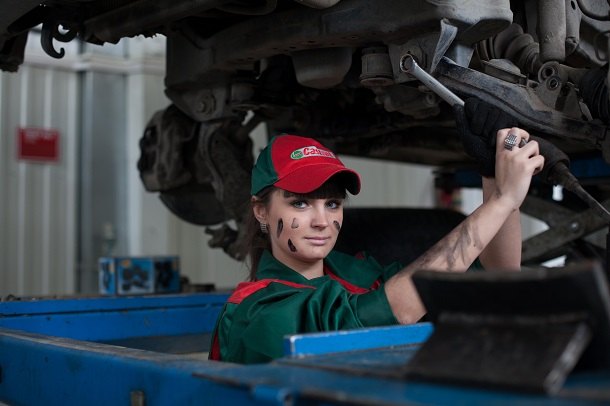Dealers (Maybe) Using Service Department Revenue to Offset Sales Downturn

For a variety of reasons (the post-recession binge finally cooling off is the biggest), new-car sales are down in the United States. One would expect that would hurt the revenue of new-car dealerships. Not so much, it turns out, as dealers have found other ways to generate revenue. Or at least that’s what a Bloomberg report says. But there are caveats that suggest the Bloomberg piece may be generalizing. In other words, maybe some shops are seeing more revenue from more work, but other shops aren’t, even as they get busier, due to other factors.
Traditionally, new-car dealerships have always generated revenue and profit from their service and parts departments – and those departments outshine sales at many stores. So it’s not surprising to see dealers turning to a reliable profit center when sales slump.
There is one extenuating factor, however. Despite the flurry of post-recession sales over the past seven years, the American vehicle fleet remains old.
“The vehicle fleet is still getting older every single year, in spite of our record sales,” Steve Szakaly, chief economist for the National Automobile Dealers Association, told Bloomberg. “So you’ve got a significantly larger population of vehicles that require service and are coming in for service pretty regularly.”
It also stands to reason that all those new cars sold since the economic recovery began need both routine maintenance work and repairs – and some are out of new-car warranty by now. All those sales almost certainly boosted service volume.
Bloomberg notes that after the Great Recession, new-car stores improved their service business to steal share from independent shops. The article doesn’t really back up that claim – dealers already did a nice service business before the Recession. Regardless, it does make sense that an aging vehicle fleet would provide work for the service facilities at new-car dealerships, along with independent shops. Of course, auto-parts stores are also benefitting from this.
Mark Bilek, senior director of communications and technology at the Chicago Automobile Trade Association, stated that even if there are more cars on the road that may need repairs, new-car warranties last longer now and manufacturers are working to cut flat-rate hours assigned to jobs, especially on warranty work, which has l ong paid less to techs and their shops than customer-pay work. The repair process for recalls has also changed. So those factors may prevent some shops from generating more revenue, even as they become busier.
Perhaps dealers are seeing more revenue from more service work, as Bloomberg says. Perhaps not. Either way, the landscape is different than it was less than a decade ago.
“It really goes to the fundamentals of how the industry has changed since the last recession,” Szakaly told Bloomberg. “It’s becoming more diversified.”

Tim Healey grew up around the auto-parts business and has always had a love for cars — his parents joke his first word was “‘Vette”. Despite this, he wanted to pursue a career in sports writing but he ended up falling semi-accidentally into the automotive-journalism industry, first at Consumer Guide Automotive and later at Web2Carz.com. He also worked as an industry analyst at Mintel Group and freelanced for About.com, CarFax, Vehix.com, High Gear Media, Torque News, FutureCar.com, Cars.com, among others, and of course Vertical Scope sites such as AutoGuide.com, Off-Road.com, and HybridCars.com. He’s an urbanite and as such, doesn’t need a daily driver, but if he had one, it would be compact, sporty, and have a manual transmission.
More by Tim Healey
Latest Car Reviews
Read moreLatest Product Reviews
Read moreRecent Comments
- Probert They already have hybrids, but these won't ever be them as they are built on the modular E-GMP skateboard.
- Justin You guys still looking for that sportbak? I just saw one on the Facebook marketplace in Arizona
- 28-Cars-Later I cannot remember what happens now, but there are whiteblocks in this period which develop a "tick" like sound which indicates they are toast (maybe head gasket?). Ten or so years ago I looked at an '03 or '04 S60 (I forget why) and I brought my Volvo indy along to tell me if it was worth my time - it ticked and that's when I learned this. This XC90 is probably worth about $300 as it sits, not kidding, and it will cost you conservatively $2500 for an engine swap (all the ones I see on car-part.com have north of 130K miles starting at $1,100 and that's not including freight to a shop, shop labor, other internals to do such as timing belt while engine out etc).
- 28-Cars-Later Ford reported it lost $132,000 for each of its 10,000 electric vehicles sold in the first quarter of 2024, according to CNN. The sales were down 20 percent from the first quarter of 2023 and would “drag down earnings for the company overall.”The losses include “hundreds of millions being spent on research and development of the next generation of EVs for Ford. Those investments are years away from paying off.” [if they ever are recouped] Ford is the only major carmaker breaking out EV numbers by themselves. But other marques likely suffer similar losses. https://www.zerohedge.com/political/fords-120000-loss-vehicle-shows-california-ev-goals-are-impossible Given these facts, how did Tesla ever produce anything in volume let alone profit?
- AZFelix Let's forego all of this dilly-dallying with autonomous cars and cut right to the chase and the only real solution.


































Comments
Join the conversation
I stopped going to dealers years ago. Recently I went back to an Acura dealer for an oil change as I move around a lot for contracting work and I didn't know of any good local shops. $45 for synthetic oil change and free car wash, not bad, but then they recommended $3,082 in repairs on an otherwise flawlessly running TSX. The service rep made it sound like my car will break down at any moment without these repairs (shocks, belts, tire rotation, transmission fluid, forgot what else). They used to pull this on me all the time. I learned the hard way, after getting second opinions from local shops and learning how much I was getting ripped off. They will over-repair if you let them.
I guess it is a good thing I am no longer working for the OEM's. I don't understand the business anymore. Money is dirt cheap. New and used sales have hit record levels. The manufacturers have reduced their factory employees while still having great productivity. When we first started the Holy Grail build rate was 10 million. The prime money rate was about 4%. With every member of our family doing something, we managed to be profitable in year two. Now the build is 17 million, the money 1% and the corporations are in the doldrums. I guess if you have not made money in these times, you have your answer to the question many fear to ask themselves.